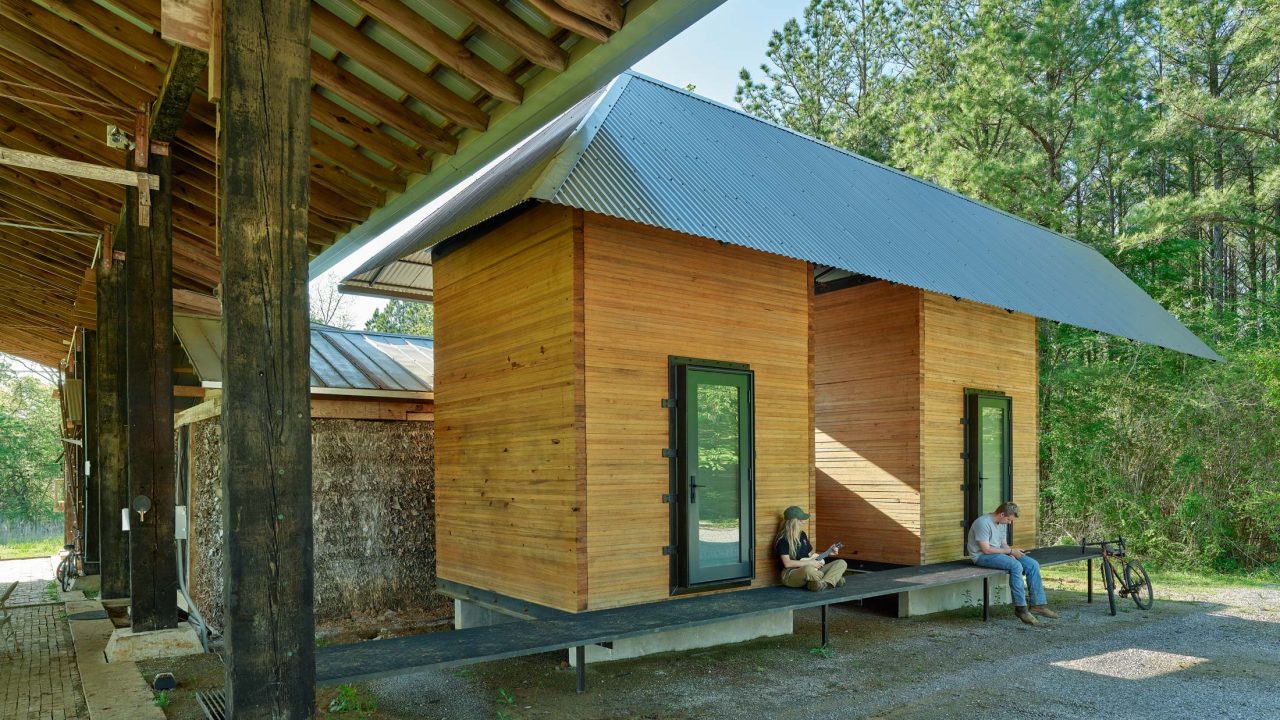Rural Studio Research Explores Mass Timber Construction

Mass timber is a technology in which building materials are created by gluing, nailing or doweling together wood products, and it is rapidly growing in popularity in the design and construction fields.
The College of Architecture, Design and Construction’s (CADC) Rural Studio in Newbern, Alabama, is the home of three different research projects exploring the use of mass timber.
Mass timber products, which include structural panels, beams and columns, are engineered to be as strong as concrete and steel while weighing less. Not only is mass timber a more environmentally friendly product, but it is also aesthetically pleasing and makes for faster, quieter and less wasteful construction. Faculty, staff and fifth-year and graduate students have been working together at Rural Studio to explore how to use mass timber products to build more efficient and sustainable structures. “The novel use of timber at Rural Studio is key to thinking about the environmental and economic future of western Alabama,” stated CADC Professor of Practice Kiel Moe. “These projects use local timber material to achieve a variety of benefits, including caring for forests, local industry and inhabitants, and share open-source knowledge about these techniques with others in the region.”
The Breathing Wall Mass Timber Research Project began in 2019 with team members studying how building systems can work together to reduce environmental impact and energy costs. They wanted to explore alternative enclosure and ventilation systems and their impact on both construction and everyday energy costs. They used mass timber materials to create the structure and insulate the building while also giving the interior and exterior a beautiful finish. The Breathing Wall team published a paper titled “The Design of Mass Timber Panels as Heat-Exchangers (Dynamic Insulation)” in the January 2021 edition of Frontiers in Built Environment. Alumnus Jake Elbrecht spent five semesters at Rural Studio and is now a Visiting Assistant Research Professor in CADC’s McWhorter School of Building Science. “Our design-build research focused on two parts: how you design the connections between different types of mass timber elements, like floors and walls, and how the inherent thermal properties of wood reduce the need for additional insulation and building systems,” he explained.
The research into mass timber systems taking place at the Rural Studio is part of a larger initiative within the CADC.
In an attempt to build climate-resilient buildings, a team of researchers began the Thermal Mass & Buoyancy Ventilation Research Project 2020. They designed and built two test buildings to explore how internal thermal masses can control interior temperature and ventilation passively and reduce energy costs. This passive ventilation, developed by applying mathematical scaling rules, means that a structure can be occupied without needing mechanical heating and cooling systems. In September of 2021, the team published a paper titled “Synchronized Coupling of Thermal Mass and Buoyancy Ventilation: Wood versus Concrete” in the Journal of Physics: Conference Series.
The Rural Studio Bathhouse is the most recent mass timber research project. A team of graduate students is currently working to design a bathhouse with showers, toilets, sinks and laundry space for third year students living at Rural Studio. The team is using mass timber to create a functional bathroom facility that can manage water and humidity while also being aesthetically pleasing, and their current focus is on the creation of floor plans that integrate an outdoor shower and a roof that allows for daylight. Team members have had the benefit of utilizing the Breathing Wall and Buoyancy projects to research their options in using mass timber.
“The research into mass timber systems taking place at the Rural Studio is part of a larger initiative within the CADC to explore strategies and technologies that expand the utilization of Southern forest products in building construction,“ stated David Hinson, CADC’s Associate Dean for Research and Graduate Studies. “The CADC sees mass timber and related advanced wood products as a transformative way to address climate change impacts, create beautiful and innovative buildings and expand economic opportunities throughout our region. Faculty across our college, and across Auburn University, are collaborating to explore the potential of these systems to pave the way for a more sustainable future.”
See more in:
Faculty Work, Mass Timber, Research, Rural Studio, Student Experience
Related people:
David Hinson, Jake Elbrecht


